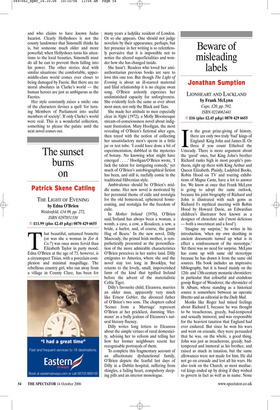The sunset burns on
Patrick Skene Catling
THE LIGHT OF EVENING by Edna O’Brien Weidenfeld, £14.99, pp. 272, ISBN 0297851330 ✆ £11.99 (plus £2.45 p&p) 0870 429 6655 That beautiful, untamed brunette (or was she a woman in Zee & Co.?) was once more fervid than Elizabeth Taylor in party mood. Edna O’Brien at the age of 73, however, is a circumspect Titian, with a porcelain complexion and minimal maquillage. The rebellious country girl, who ran away from a village in County Clare, has been for many years a ladylike resident of London. Or so she appears. One should not judge novelists by their appearance, perhaps, but her presence in her writing is so relentlessly pervasive that it is impossible not to notice the altered superficialities and wonder how she has changed inside.
She hasn’t. Readers who loved her antiauthoritarian previous books are sure to love this one too. But though The Light of Evening is about an ill-starred maternal and filial relationship it is no elegiac swan song. O’Brien ardently expresses her undiminished capacity for unforgiveness. She evidently feels the same as ever about most men, not only the Black and Tans.
She made her attitude to men especially clear in Night (1972), a Molly Bloomesque stream-of-consciousness novel about indignant frustration. Mary Hooligan, the most revealing of O’Brien’s fictional alter egos, then toyed with the notion of collecting her unsatisfactory men’s sperm in a little jar or test tube. ‘I could have done a bit of experimentation, dabbled in the mysteries of botany. No knowing what might have emerged . . . .’ Hooligan/O’Brien wrote, ‘I lack the talent for instigating comedy,’ yet much of O’Brien’s autobiographical fiction has been, and still is, ruefully comic in the traditional Hibernian style.
Ambivalence should be O’Brien’s middle name. Her new novel is motivated by her perennial theme of exile and nostalgia for the old homestead, ephemeral homecoming, and nostalgia for the freedom of exile.
In Mother Ireland (1976), O’Brien said,‘Ireland has always been a woman, a womb, a cave, a cow, a Rosaleen, a sow, a bride, a harlot, and, of course, the gaunt Hag of Beara.’ In the new novel, Dilly Macready, the primal Irish mother, is sympathetically presented as the personification of the more admirable characteristics O’Brien perceives in her native land. Dilly emigrates to America, where she and the novel stay too long in Brooklyn, but returns to the lovely, small, impoverished farm of the kind that typified Ireland before the advent of the materialistic Celtic Tiger.
Dilly’s favourite child, Eleanora, marries an older man, apparently very much like Ernest Gebler, the divorced father of O’Brien’s two sons. The chapters called ‘Scenes from a Marriage’ represent O’Brien at her prickliest, damning ‘Hermann’ as a bully jealous of Eleanora’s natural literary fluency.
Dilly writes long letters to Eleanora about the simple virtues of rural domesticity, advising her to reform and telling her how her former neighbours resent her recognisable portrayals of them.
To complete this fragmentary account of an affectionate dysfunctional family, O’Brien depicts the fearful last days of Dilly in a Dublin hospital, suffering from shingles, a failing heart, compulsory sleeping pills and an interior monologue.


































































































 Previous page
Previous page